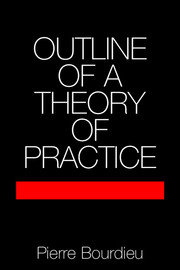2 - STRUCTURES AND THE HABITUS
Published online by Cambridge University Press: 05 March 2013
Summary
Methodological objectivism, a necessary moment in all research, by the break with primary experience and the construction of objective relations which it accomplishes, demands its own supersession. In order to escape the realism of the structure, which hypostatizes systems of objective relations by converting them into totalities already constituted outside of individual history and group history, it is necessary to pass from the opus operatum to the modus operandi, from statistical regularity or algebraic structure to the principle of the production of this observed order, and to construct the theory of practice, or, more precisely, the theory of the mode of generation of practices, which is the precondition for establishing an experimental science of the dialectic of the internalization of externality and the externalization of internality, or, more simply, of incorporation and objectification.
A false dilemma: mechanism and finalism
The structures constitutive of a particular type of environment (e.g. the material conditions of existence characteristic of a class condition) produce habitus, systems of durable, transposable dispositions, structured structures predisposed to function as structuring structures, that is, as principles of the generation and structuring of practices and representations which can be objectively “regulated” and “regular” without in any way being the product of obedience to rules, objectively adapted to their goals without presupposing a conscious aiming at ends or an express mastery of the operations necessary to attain them and, being all this, collectively orchestrated without being the product of the orchestrating action of a conductor.
- Type
- Chapter
- Information
- Outline of a Theory of Practice , pp. 72 - 95Publisher: Cambridge University PressPrint publication year: 1977
- 37
- Cited by

